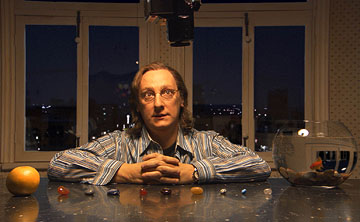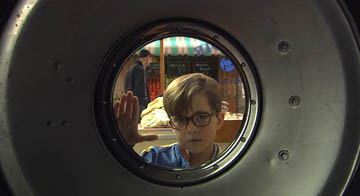

Most of the time, film adaptations of stage plays have a static feel to them. They feel confined, like they are still on a stage. The Far Side of the Moon was based on Robert LePage's well-received one-man play, bears none of these hallmarks. In fact, after seeing it, it really makes one wonder how the heck he was able to do the things he did on film on a stage. The movie is a meditative rumination on the nature of man, life, death, duality, and purpose. It sounds a bit heavy, and it is at times, as well as a bit slow, but LePage (Possible Worlds, No) spices things up with beautiful imagery (courtesy of his decision to shoot on high definition video), smooth segues to the past, and compelling characters.
LePage plays Philippe, a man in his forties who is going nowhere. He's a bit porky, needs a haircut, has a big nose, and still lives at home. He finished his dissertation long ago, but is afraid to take the final step to defend it. Instead, he works as a telemarketer selling papers, and keeps himself busy, mainly so he doesn't have to think about other things. Philippe is interesting in that he is not a likable character. He whines, and often becomes unnecessarily argumentative. He's very bitter about where he is in life, yet fails to realize that he is the one responsible, and that if he acts, he can do something. Shortly before The Far Side of the Moon begins, Philippe's mother died, and he's arguing with is brother Andre about what to do with her things.
Andre is the opposite of Philippe. He has a relatively successful life as a meteorologist. He's in a relationship with another man, and sports shorter hair and a goatee. And LePage plays him too. The transformation is good since LePage not only looks different, he acts and carries himself differently. Philippe resents Andre's success, and the fact she left Andre money when Philippe clearly needed it more. Nevertheless, Andre can come off as a jerk, and it's not easy to like him either. A few opportunities arise for Philippe to do something with his life. The first is a project in conjunction with SETI. They want people to film something about themselves. The winners chosen by SETI will have their films broadcast out into space. Philippe goes about this task with gusto. He also has the chance to meet a renowned Russian scientist, and wants this person to read his thesis, which postulates that narcissism was responsible for the space race.
Philippe is obsessed with space, and has been ever since he was a child. Frequent flashbacks show his relationship with his mother (Anne-Marie Cadieux, How My Mother Gave Birth to Me During Menopause, Set Me Free) and a childhood illness that may explain the person he is today. There is a confessional feel to the film, which causes it to seem a bit pretentious at times. Still, LePage gives a good performance (well, two) as a man who has a bad tendency to self-destruct at all the wrong moments (at a conference in Russia, in a bar, on the phone with an ex-girlfriend...). He's recording his life both to show others why he is important, and probably to prove to himself also. The Far Side of the Moon was Canada's entry to the 2004 Academy Awards (and is receiving distribution nearly two years later), and also garnered Genie nominations (the Canadian Oscars) in most major categories (Best Director, Film, Actor), and won for Best Adapted Screenplay.